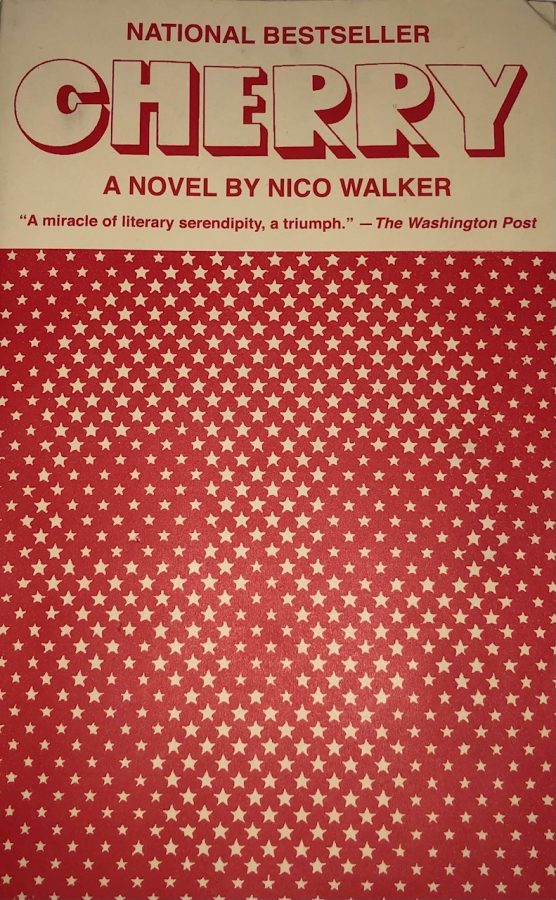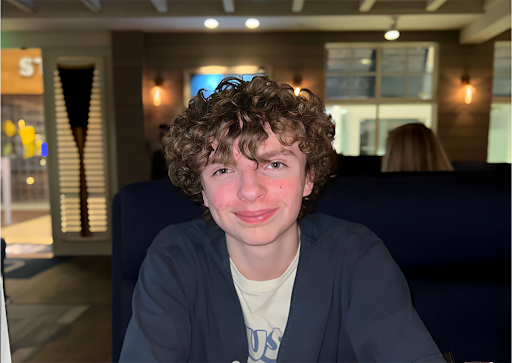‘Cherry’ nails book-to-screen adaptation
Nico Walker’s harrowing novel describes the opioid epidemic and the downfall of a young war veteran.
March 18, 2021
Note: Minor spoilers are included in this post. You have been warned!
When a movie based on a best-selling novel comes out, the age-long debate on whether the “movie is better than the book” and vice-versa emerges. Viewers thoroughly analyze stories and screenplays to make sure nothing new was added. Strayed storylines agitate the traditional readers while new readers stick with the movie. Famous director-duo the Russo Brothers, famously known for directing Marvel movies, teamed up with Tom Holland to direct the new hard-hitting Apple TV movie “Cherry.”
Nico Walker’s debut novel tells the story of a young man (who goes by the code-name Cherry) falling in love with Emily, a girl who attends his college. Scared to mess up their relationship, on a whim, he signs up to join the Army. However, becoming a medic is not all it is cracked up to be. He loses sleep over night raids and witnesses several men die. He returns home with profound PTSD and an addiction to opiates. Wanting to feed his heroin addiction, he becomes a serial bank robber in order to pay off his dealer debt.
The book, while 70 chapters, is only 313 pages, making it a quick read. The dialogue flows between short choppy sentences and endless run-on sentences to fit the mood, giving character to Cherry even though he seldom describes himself. Extremely heavy, coarse language and descriptive paragraphs of shooting up drugs make this novel fitting for mature audiences. The main character makes the reader root for him even though he acts like a complete jerk. While the novel is sprinkled with intense scenes of action, there is not a redeemable character arc. It’s a slowly descending downfall of a college student who had much potential to achieve great things.
Cherry (played by Tom Holland) plays, not one, but several characters. He is a student, a boyfriend, a medic, a junkie and a criminal. His girlfriend, Emily, (played by Ciara Bravo) falls submissive to his demons and becomes addicted to opiates in order to maintain their relationship. Both Holland and Bravo deliver harrowing performances as they spiral out of control. The gruesome details of withdrawal and addiction are emphasized through verbal fights, near overdoses and the consistent craving, pushes the actors to the brink. Holland is known for playing naive teenagers, but his performance is unlike anything his fans have seen. From screaming at bank tellers one minute to sobbing from PTSD the next, his range is impeccable.
While the acting from Holland and Bravo are outstanding, the screenplay itself is mediocre in comparison. Some viewers may be confused with the shift between voiceover to dialogue as it does not stay consistent. Similar to the book, the movie is divided into six parts. The choppiness makes the movie seem stilted instead of smoothly transitioning. The cinematography is on point as it envelops the viewer into a dorm room, onto the battlefield or inside a held-up bank. The score has several hit-or-miss moments. While a tender moment between Cherry and Emily gets soft piano, a scene of shooting heroin gets an operatic piece as opposed to rap music. Mild inconsistencies throughout the movie do not release the potential that the novel held.
Despite certain aspects, the movie nearly nails in comparison with the book, making it the closest book-to-film adaptation that I have ever seen. Discrepancies between the novel and the movie include characters that influence Cherry’s drug use and his avid partying to prevent PTSD when he returns from Iraq. While these certain details seem minor, they give depth to the story. Holland’s ability to fluctuate effortlessly through the characters with ease proves that his career is only just getting started. As Walker writes about “taking the beautiful things to heart until one about dies from it,” the Russo brothers created a film that brings out the tragedy of addiction birthed from good intentions.









